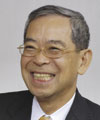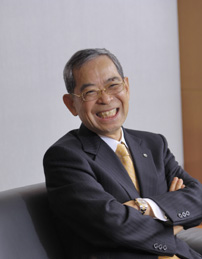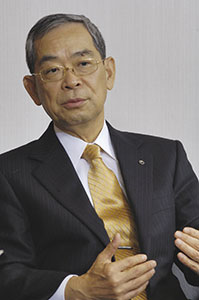 |
|||||||||
|
|
|||||||||
|
View from the Top Vol. 7, No. 3, pp. 1–4, Mar. 2009. https://doi.org/10.53829/ntr200903tp1  Overcoming Stagnation— Taking the Worldwide Slowdown as an Opportunity to Rethink the Way We Do BusinessOverviewKnown for his ability to lead with innovative ideas, Shinichi Otake became president of NTT WEST in June 2008 right in the middle of a worldwide economic slowdown. We asked him about locally based expansion of business, which is characteristic of western Japan, starting with the company’s move toward office-oriented sales targeting small and medium-sized companies. Now is the time to be faithful to customers and needs in the field—Mr. Otake, half a year* has passed since you took up your post as president. How do you view the current situation at NTT WEST? One feature of the information & communications market in western Japan is the increasing demand for broadband services, but competition for customers among NTT WEST, power companies, and cable TV providers has become quite severe. To make matters worse, the fixed-line phone market is still contracting, and because revenues from Internet protocol (IP) systems have not made up for this reduction in existing services, we find ourselves in a very difficult business environment. Nevertheless, we are moving forward with radical cost control measures centered on more efficient use of manpower. On the basis of our first half-year results, we are pretty much on course to meet our profit targets for the year. Considering these circumstances, we have established three pillars of business activities as a foundation for achieving the goals of our medium-term management strategy by 2012. These pillars are:
Our efforts to implement them began in earnest in 2009. —Is it possible to make progress despite these severe conditions of a worldwide slowdown? If you look at current trends in that way, nothing will ever get done. There will always be something that people need regardless of the times. Instead of lamenting over harsh conditions, we are applying our ability to recognize what it is that people really need at this point in time. Until recently, NTT WEST had been promoting “Customer-First Activities,” but it has made a substantial shift to “With-Customer Activities” to get customers to choose NTT WEST services and use them on an ongoing basis. The idea here is to put ourselves in our customers’ shoes, adopt their ways of thinking, and develop and improve products and services based on their comments and opinions. Of course, that is not to say that we turned a deaf ear to our customers in the past, but we have operated in a disjointed manner, with the department in charge of optical circuits only selling optical circuits and the department in charge of terminals only selling terminals, for example. As a result, we have not been able to collect in a unified manner the data that could tell us exactly what kinds of situations the customers are in. To change this state of affairs, we have launched an Office Sales System to understand the customers’ environments and plan appropriate sales approaches. This system targets small and medium-sized business establishments. For example, in response to customers who have voiced a need for an all-in-one package that can manage optical circuits, terminal devices, and employee working hours, we have prepared a variety of products. And these days, we are visiting our customers even more than before to make detailed observations with the aim of finding out what it is they need and what is the best environment to construct for each of them. In this way, we have been able to accurately determine what customers desire. Although we have just started to expand services in this way, we can already sense that the number of potential customers for such services is huge.
Our slogan: “Itsumo, Anata-no, Sobani-iru.” (Always with You.)—It appears that everyone at NTT WEST is playing a role closer to customers. I often tell NTT WEST employees that each and every one of them who meets customers is recognized as a part of NTT WEST’s services. I want our customers to really feel through each of our employees that NTT WEST is not just products and services but also a company that has its eyes on its customers. In an era in which customers have become increasingly diversified and the adoption of broadband connections has exceeded 50% of all households, we must respond accurately to the needs of the elderly and to Internet beginners. While customers know that they want to be provided with information, they may not know how to go about constructing an optimal telecommunication system on their own and may feel distressed about that. That is why we must review and revise our employee training and business operation system if we are to raise the level of customer response at NTT WEST. This will involve improving our conversational skills, recording customer comments and opinions in a database so that they can be analyzed and shared among employees, and telling customers how the results of studying their needs have been incorporated into NTT WEST’s business. The aim here is to expand services with a greater sense of urgency. By putting ourselves in our customers’ shoes, we hope to feel our service quality, rates, satisfaction level, and so on in a manner more like our customers do. In this regard, we have adopted the slogan: “Itsumo, Anata-no, Sobani-iru.” (Always with You.)
—It’s a very appealing slogan. In what NTT WEST business is it specifically reflected? We expanded the deployment area of the FLET’S Hikari Next NGN service to the Osaka “06” area code in September 2008. The plan is to further expand the deployment area to ordinance-designated cities by January 2009 and to some cities with prefectural government offices by March 2009. New services making use of the Next Generation Network (NGN) will be part of our attempt to collaborate with a variety of enterprises and expand the business of software as a service (SaaS). In particular, given that there are many small and medium-sized businesses in western Japan, there is naturally a need to enrich services in line with that characteristic, but when producing new services, it’s best to apply the ideas and desires of many people. I think that it’s important to propose a plan that considers possibilities from many different angles and not just from the perspective of NTT WEST, customers, or communications-related companies. The six regional companies in the NTT WEST–Hometechno group began commercial operations in July 2008 with the aim of expanding the business for at-home use. They are promoting convenient services for home users such as the wiring and repair of network devices in the home based on an outsourcing system with a staff of over 10,000. These services include the repair of non-NTT home appliances purchased at mass retailers and the configuring of personal computers. The creation of new maintenance menus and user support services for home networks and information devices is now underway centered on the NTT WEST–Hometechno companies. In addition to services that directly target customers, these NTT WEST–Hometechno companies are promoting extensive cost-reduction plans such as the centralizing of business operations into “area-free” bases to reduce outsourcing costs.
Providing creative solutions promptly when they are needed—Last year, against the backdrop of rapidly changing times, four Japanese researchers won Nobel Prizes in the same year. Do you have any deep interest in the new technologies that they presented? Well, Japan’s research expertise is certainly attracting worldwide attention. I found the world’s first generation of induced pluripotent stem cells (iPS cells) by Professor Shinya Yamanaka’s group at Kyoto University simply amazing, and I’m deeply interested in the launch of the Maido No. 1 satellite developed in Higashiosaka. I also find the advances being made in robot technology to be remarkable. Interest in robot technology is particularly high in western Japan, and NTT WEST is participating in studies for the “Kita-umeda Robot × Ubiquitous city vision” scheduled to open in Kita-umeda, Osaka, in 2011. In the world of communications, it is often said that Europe and the USA are leading the way, but in terms of cell phones and other ubiquitous technologies, Japan is not just holding its own but leading the way as well. —NTT R&D is also leading the world in NGN and other technologies. This must put great expectations on NTT R&D institutions from both inside and outside the NTT Group. What does NTT WEST expect of NTT R&D? The source of competitiveness is new products and services, but we are unfortunately in an era in which companies are quick to emulate other companies in making products. It is exactly in times like these that we must return to the roots of our business, by which I mean we must give hard thought to what it is that people desire. It is also essential that we have the ability to provide what our customers need in a speedy and timely manner. To this end, basic research is more important than anything else. What I need from NTT researchers is creative technology, and I believe that basic research is the basis for such creativity. Basic research consists of hardworking, patient efforts with an eye to the future; as long as researchers have a firm conviction that “this will really be useful in future society,” their work will someday bear fruit in some way, shape, or form.
Interviewee profileCareer highlightsShinichi Otake joined Nippon Telegraph and Telephone Public Corporation (now NTT) in 1971. He became General Manager of NTT’s Himeji branch in 1991 and Deputy General Manager of the Tohoku Regional Communications Sector in 1995. Thereafter, he held many executive posts, some of them concurrently: Executive Manager, Strategy Planning Department, NTT Affiliated Business Headquarters, in 1997; Executive Director, Maintenance and Service Operation Department, NTT WEST, in 1999; Vice President and Executive Director, NTT Department II (network strategy), in 2000; President, NTT-ME Tokyo Corporation, in 2002; President, NTT-ME Service Tokyo Corporation, in 2003 (additional); Executive Vice President and Senior Executive Manager, Solution Business Headquarters, NTT WEST, in 2004, Executive Vice President and Senior Executive Manager, Strategic Project Promotion Headquarters, NTT WEST (additional), in 2006; and Senior Executive Vice President and Senior Executive Manager, Strategic Project Promotion Headquarters, NTT WEST, in 2007. He took up his present position in June 2008. |
|||||||||










